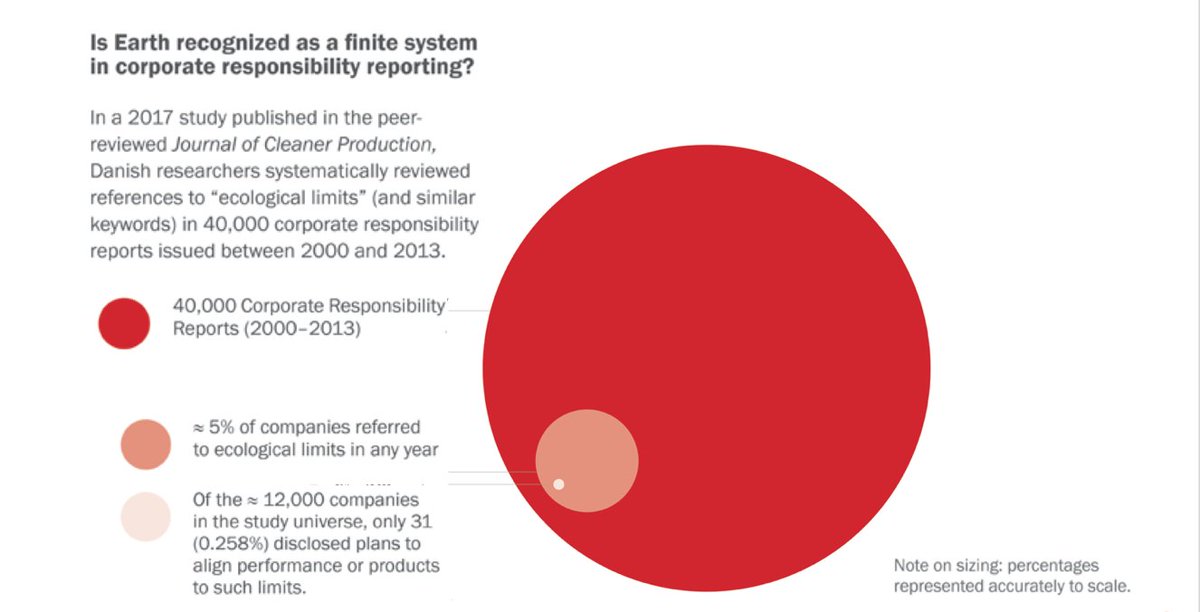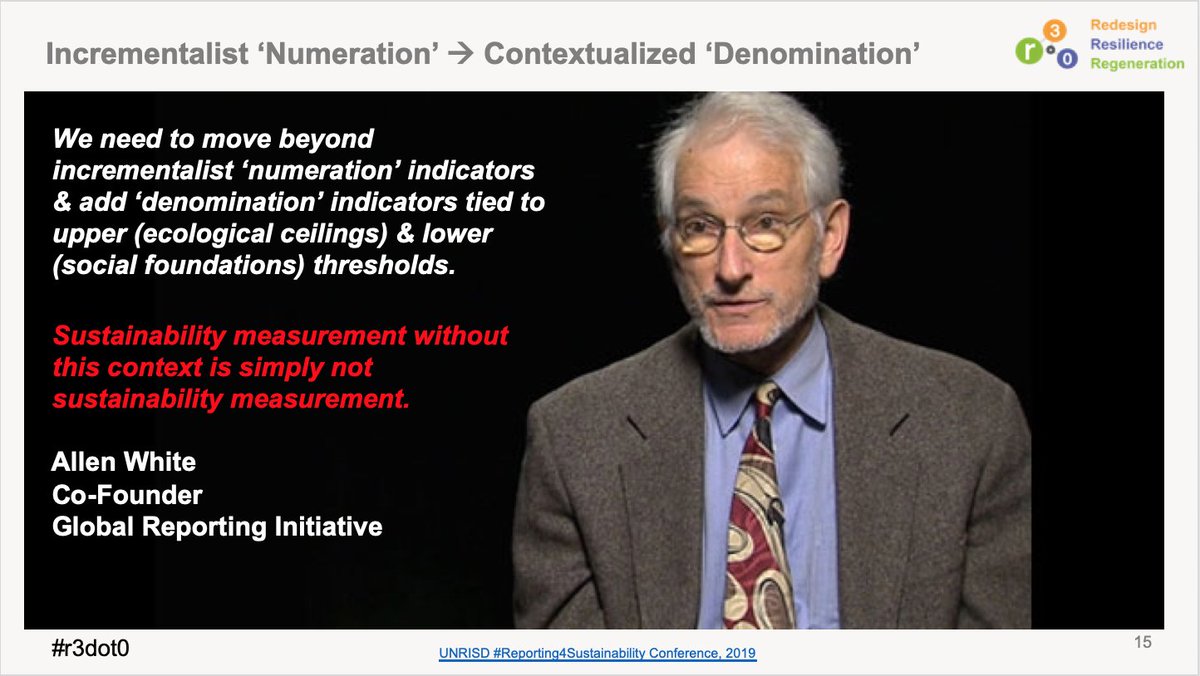Sustainability reporting – But this Time with Meaning
By @adamgarfunkel1 of @junxion
https://junxion.com/indicators-for-a-meaningful-sustainability-report/
It’s so damn good, it warrants a thread!
By @adamgarfunkel1 of @junxion
https://junxion.com/indicators-for-a-meaningful-sustainability-report/
It’s so damn good, it warrants a thread!
"I am simultaneously an advocate for corporate transparency and a critic of almost all reporting. Why? The simple answer is reports fail to tell readers anything valuable about how sustainable the business is. They fail at the one key thing they exist to achieve."
"Next year will mark 25 years since I wrote my first sustainability report—so I’ve worked on them longer than just about anyone…
[A]fter writing about a hundred sustainability reports, I’m convinced it’s time they got a serious upgrade."
[A]fter writing about a hundred sustainability reports, I’m convinced it’s time they got a serious upgrade."
"There can be no sustainable business in an unsustainable world. If you want to show a reader how environmentally responsible you are, you can only do it with reference to ecological limits…"
"You can’t say ‘we are 5% better than last year’ as if that’s sufficient information. A reader can’t look at 5% better and know if that’s good enough. There’s no reference point there. It’s essentially meaningless."
"Ever since the 2nd version of the @GRI_Secretariat guidelines (now standards) on sustainability reporting, there has been a call for this context. Reporting companies have been encouraged to report on their performance relative to ... ‘the state of the world’.”
"In theory, for nearly 20 years, companies that have been following the GRI guidelines should have been citing their performance in the context of what is needed so we can all live well on our one, beautiful planet."
"That hasn’t happened: most reporters don’t even talk about limits.
A 2017 study looking at 12k susty reporters found mentions of plans to align performance with such ecological limits in only 31. That’s just a hair over one quarter of one per cent!
https://www.sciencedirect.com/science/article/abs/pii/S0959652615019204
A 2017 study looking at 12k susty reporters found mentions of plans to align performance with such ecological limits in only 31. That’s just a hair over one quarter of one per cent!
https://www.sciencedirect.com/science/article/abs/pii/S0959652615019204
"As Allen White, co-founder of the Global Reporting Initiative has said:
'Sustainability measurement without this context is simply not sustainability measurement.'”
'Sustainability measurement without this context is simply not sustainability measurement.'”
"This brings us to an interesting dilemma for reporters: what do we measure & report on that will show progress against these ecological ceilings & social foundations? Because it is clear that the familiar indicators—say, how many Co2e kg per product...—don’t take us very far."
"An incremental key performance indicator like that is only a first step, divorced as it is from context. It tells us nothing about whether that performance is aligned to the Paris Climate Agreement…"
"A company can now get its carbon reduction plan reviewed by the Science-Based Targets initiative (SBTi) and get approved when its plan is good enough to stay within those limits. Then readers know how well the company is doing in the context of our climate crisis."
"The problem has been in determining what the context-based indicators are for the whole basket of social and environmental issues a company might need to report about."
"The United Nations Research Institute for Social Development ( @UNRISD) and @r3dot0 ... are partnering in a pilot exploration of a set of indicators that cover both the incremental and the context-based indicators."
"These tier 2 context-based indicators might measure performance against an agreed norm, such as near-zero carbon emissions. A 3rd tier of indicator address the kinds of organizational transformations necessary to achieve truly sustainable economy & society…"
"At @junxion, we are Advocation Partners of r3.0, because we believe that incremental indicators can only ever be a starting point. Companies need to go further: they simply must account for their performance in relation to a threshold of what the world can bear."
"They should be showing us how they are contributing to the transformation the world needs.
As reporting specialists w/100s of sustainability & impact reports in our work history, we @junxion are looking for companies keen to explore this framework—with us as your guides."
As reporting specialists w/100s of sustainability & impact reports in our work history, we @junxion are looking for companies keen to explore this framework—with us as your guides."
"This is a key stage in a 4-year project which aims to improve the methodologies and indicators that measure companies’ sustainability... This is our invitation to you to demonstrate your leadership and commitment to real transparency."
"Donella Meadows, one of the authors of the seminal 1972 Limits to Growth, said…
“[S]ustainability indicators should be related to carrying capacity or to threshold of danger…"
“[S]ustainability indicators should be related to carrying capacity or to threshold of danger…"
"Tons of nutrient per year released into waterways means nothing to people.
Amount released relative to the amount the waterways can absorb without becoming toxic or clogged begins to carry a message.” [Dana Meadows]
http://donellameadows.org/wp-content/userfiles/IndicatorsInformation.pdf
Amount released relative to the amount the waterways can absorb without becoming toxic or clogged begins to carry a message.” [Dana Meadows]
http://donellameadows.org/wp-content/userfiles/IndicatorsInformation.pdf
"That’s what the goal of reporting should be: to clearly communicate with your stakeholders about your real sustainability performance in ways that ‘carry a message.’"
"This is an opportunity to move your reporting to the next level, to contribute to a global effort to improve sustainability indicators and to demonstrate your authentic commitment to leadership in this space."

 Read on Twitter
Read on Twitter

!["Donella Meadows, one of the authors of the seminal 1972 Limits to Growth, said…“[S]ustainability indicators should be related to carrying capacity or to threshold of danger…" "Donella Meadows, one of the authors of the seminal 1972 Limits to Growth, said…“[S]ustainability indicators should be related to carrying capacity or to threshold of danger…"](https://pbs.twimg.com/media/EnDlVljWMAcVFCX.jpg)


